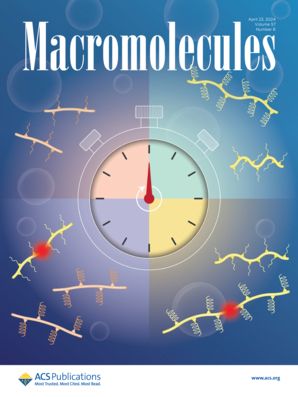Temperature-Dependent Fracture Toughness of Epoxy Vitrimers
IF 5.1
1区 化学
Q1 POLYMER SCIENCE
引用次数: 0
Abstract
Vitrimer, a class of covalent dynamic networks, is promising for polymeric applications requiring reshaping, recycling, and self-healing. The dynamic bonds in vitrimer can be reversibly broken and reformed under thermal actuation. This work investigates the effects of temperature on the fracture toughness of soft epoxy vitrimers. We measured the fracture toughness above the topology freezing temperature. Elevated temperatures reduce both fracture stretch and toughness, while they linearly increase the modulus. Given the invariant cross-linking density, the temperature dependence of fracture toughness is attributed to the sensitivity of the bond-exchange reactions. We extend the Lake–Thomas theory by incorporating kinetic bond scission to elucidate such dependence in epoxy vitrimers. Unlike conventional elastomers with a threshold of decreased fracture toughness at elevated temperatures, our theory indicates the continuous decrease of fracture toughness until approximating a zero value, aligning with the unique viscous behavior of vitrimers.

温度对环氧树脂断裂韧性的影响
Vitrimer是一类共价动态网络,在需要重塑、回收和自我修复的聚合物应用中很有前景。在热驱动作用下,玻璃体中的动态键可以发生可逆的断裂和重整。本文研究了温度对环氧软质玻璃聚合物断裂韧性的影响。我们测量了拓扑冻结温度以上的断裂韧性。升高的温度降低断裂拉伸和韧性,同时线性增加模量。在交联密度不变的情况下,断裂韧性的温度依赖性归因于键交换反应的敏感性。我们扩展了Lake-Thomas理论,结合动力学键断裂来阐明环氧树脂的这种依赖性。与传统弹性体在高温下断裂韧性下降的阈值不同,我们的理论表明,断裂韧性持续下降,直到接近零值,与玻璃聚合体独特的粘性行为一致。
本文章由计算机程序翻译,如有差异,请以英文原文为准。
求助全文
约1分钟内获得全文
求助全文
来源期刊

Macromolecules
工程技术-高分子科学
CiteScore
9.30
自引率
16.40%
发文量
942
审稿时长
2 months
期刊介绍:
Macromolecules publishes original, fundamental, and impactful research on all aspects of polymer science. Topics of interest include synthesis (e.g., controlled polymerizations, polymerization catalysis, post polymerization modification, new monomer structures and polymer architectures, and polymerization mechanisms/kinetics analysis); phase behavior, thermodynamics, dynamic, and ordering/disordering phenomena (e.g., self-assembly, gelation, crystallization, solution/melt/solid-state characteristics); structure and properties (e.g., mechanical and rheological properties, surface/interfacial characteristics, electronic and transport properties); new state of the art characterization (e.g., spectroscopy, scattering, microscopy, rheology), simulation (e.g., Monte Carlo, molecular dynamics, multi-scale/coarse-grained modeling), and theoretical methods. Renewable/sustainable polymers, polymer networks, responsive polymers, electro-, magneto- and opto-active macromolecules, inorganic polymers, charge-transporting polymers (ion-containing, semiconducting, and conducting), nanostructured polymers, and polymer composites are also of interest. Typical papers published in Macromolecules showcase important and innovative concepts, experimental methods/observations, and theoretical/computational approaches that demonstrate a fundamental advance in the understanding of polymers.
 求助内容:
求助内容: 应助结果提醒方式:
应助结果提醒方式:


